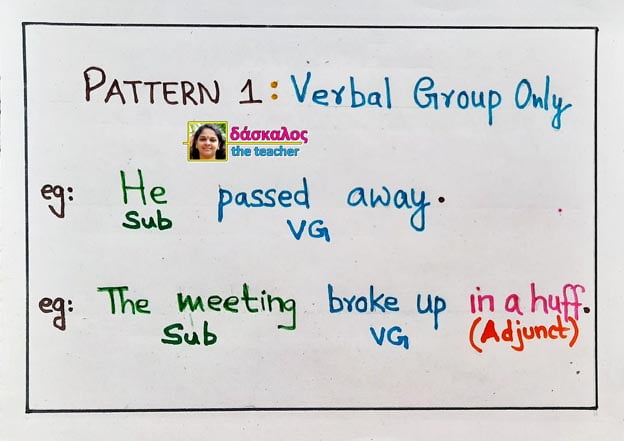A Basic or a Kernel sentence is the simplest form of sentence, which is simple (not complex or compound), declarative and affirmative, and in the active voice. Such sentences can be broadly classified into five different patterns. Two of these patterns are Intransitive (using such verbs as they do not take an object), while the other three are Transitive (verbs that take an object). Here are detailed examples of all these types.
Intransitive Predicate Phrase Patterns
Pattern 1: Verbal group only or Verbal group (+ Adjunct)

An Adjunct is a part of the sentence that can be taken out without breaking the structure of the sentence.
![]()
Take the sentence: Ramesh died yesterday at Ludhiana. If the words ‘yesterday‘ and ‘at Ludhiana‘ are removed, the sentence can still stand, but it cannot stand if the words ‘Ramesh‘ and/or ‘died‘ are removed. Such words like yesterday, at Ludhiana in this case, form the adjunct while the remaining words form the nuclear part of the sentence.
Pattern 2: Verbal group + Complement (+ Adjunct)
The complement may be a noun phrase, an adverbial, a preposition phrase or an adjective phrase.
![]()
![]()
All verbal groups cannot take all the four categories of complements, i.e., noun phrase, an adverbial, a preposition phrase or an adjective phrase. Depending upon the categories that verbal groups can take as complements, these verbal groups can be divided into six different categories.
i) Be type (is, am, are, was, were, be, been, being)
In this case, the verbal group can take all four categories as complements.
Sita is an interesting girl.
Sita was very nice.
She has been in a fix.
We are there.
ii) Become type
Here, the verbal group can take a noun phrase and an adjective phrase as complements (not an adverbial or a preposition phrase).
He became a terrorist.
She became powerful.
He got nervous.
iii) Smell type
In this case, the verbal group can use an adjective phrase as a complement (not any other 3).
The pudding tastes delicious.
The soup smells horrible.
The king felt helpless.
iv) Have type
In this case, the verbal group can take only the noun phrase as complements.
She has a pen.
This colour suits you.
She resembles her mother.
v) Behave type
In this case, the verbal group takes reflective pronouns as complements.
Sheela did not behave herself at your place.
He prides himself on his physical strength.
This little boy must behave himself.
vi) Lie type
In this case, the verbal group can take an adverbial or a prepositional phrase as a complement (not a noun phrase or an adjectival phrase).
The child lay in the pram.
She lay asleep.
Transitive Predicate Phrase Patterns
Pattern 3: Verbal group + Object (+ Adjunct)
![]()
Pattern 4: Verbal group + Indirect object (+ Adjunct)
![]()
When the direct object comes before the indirect object, the latter takes a preposition before it.
He teaches us English.
He teaches English to us.
Pattern 5: Verbal group + Object + Complement ( + Adjunct)
This complement can be a noun phrase(NP), an adjective phrase, an adverbial or a prepositional phrase.
![]()
Some Ambiguities Explained
Some sentences have a double meaning according to the labels one gives to their parts.
They called her a taxi.
Meaning 1: They nicknamed her a taxi.
Meaning 2: They called a taxi for her.
The magician made her a steam engine.
Meaning 1: The magician made a steam engine for her.
Meaning 2: The magician changed her into a steam engine by magic.
Part of the ambiguity is also due to the lexical meaning of specific words. If we were to replace the verbs, the ambiguity would be lost. This opens up a problem for structural grammar as it does not consider semantics.
Thus, there are five patterns of Basic Sentences
- Verbal group only
- Verbal group + Complement
- Verbal group + Object
- Verbal group + Indirect object + Direct object
- Verbal group + Object + Complement (Subject complement / Object complement)